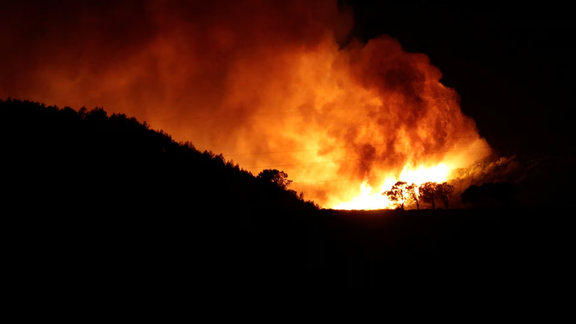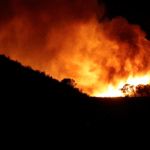
Blaze Races Toward Marseille’s Outskirts
On July 8, a ferocious wildfire erupted near Les Pennes-Mirabeau, just north of Marseille, amid a scorching Mediterranean heatwave. Fed by dry vegetation and gale-force winds reaching up to 70 km/h, the flames spread at an astonishing pace, at one point advancing more than a kilometre per minute, breaching the city’s northern districts and threatening L’Estaque and surrounding suburbs.
Injuries, Evacuations, Homes Threatened
The fast-moving inferno injured between 100 and 119 people, including at least nine firefighters and several police officers, most suffering smoke inhalation or minor burns. More than 400 residents were evacuated from Les Pennes-Mirabeau and adjacent neighbourhoods, while tens of thousands across Marseille were advised to stay indoors, keep windows closed, and avoid travel corridors to ease emergency operations. The blaze consumed between 700 and 750 hectares, destroying approximately 10 to 20 homes and damaging dozens more.
Firefighting on the Frontlines
Over 700 to 1,000 firefighters, supported by helicopters and water-bombing aircraft, including Canadair planes, launched a massive containment operation across rugged terrain. Marseille’s mayor likened their efforts to “guerrilla warfare, hoses in hand,” a reflection of the fire’s unpredictable flare-ups and the danger posed by shifting winds. By the morning of July 9, crews had largely stabilized the blaze, though hotspots remained, prompting continued vigilance.
Airport Closure Disrupts Travel
The fire forced a temporary shutdown of Marseille Provence Airport on July 8, halting operations for several hours and triggering widespread flight cancellations and diversions, to Nice, Lyon and other nearby airports. The airport resumed partial operations later that evening and full service by July 9, but residual delays and cancellations persisted.
Public Transport Under Strain
Train services and road travel were heavily disrupted. Key rail lines and sections of the A50 and A55 motorways near Les Pennes-Mirabeau were closed for safety, and local trains remained affected into the next day.
Hospitals on Emergency Power
Hospital Nord in Marseille switched to generator backup during micro power cuts, ensuring critical services like imaging stayed functional amid the smoke and evacuation chaos.
Records of the Blaze and Wider Fire Season
The blaze scorched an estimated 720 to 750 hectares and ranks as one of France’s early major wildfires this summer. It followed other major fires across southern France, including near Narbonne, amid a Mediterranean-wide environmental crisis fuelled by intense heatwaves and prolonged drought.
Government Cautions and Climate Alarm
Interior Minister Bruno Retailleau described the fire as “particularly virulent,” warning it was far from contained and committing to maintaining firefighting resources amid fiscal pressures. President Macron expressed solidarity with affected communities and emergency crews. Officials anticipate more wildfires this season due to record heat and wind, prompting calls to bolster prevention efforts and modernize firefighting fleets.
Impact on Residents and Tourism
Nearly 150,000 people in Marseille’s 16th district sheltered indoors overnight. Despite lifting confinement orders by July 9, the psychological toll remains. Tourism, crucial to Provence, is under threat, with industry experts projecting thousands of flight seat disruptions and significant drops in safety and climate perception indices.
Community Strength and Next Steps
No fatalities have been reported, a relief amid intense upheaval. As flames subside, recovery begins: evacuees must return, damaged homes assessed, and fire-weakened zones monitored. Authorities remain on high alert for flash flare-ups as the heatwave continues and drought persists.
Broader Implications for Climate Resilience
This blaze underscores a troubling trend in Mediterranean Europe, more frequent and powerful wildfires brought on by climate change. With prolonged droughts, extreme heat, and aging firefighting infrastructure, France and its neighbours face a harsh new reality. This summer likely marks the onset of an extended wildfire season, intensifying demands on emergency services and for long-term environmental adaptation.
Summary
The Marseille wildfire, driven by searing heat and strong winds, surged into city limits, injuring hundreds, displacing communities, and chilling summer travel routines. Quick action by firefighters, local officials, and emergency services prevented loss of life, but the blaze burned deep, highlighting vulnerabilities in infrastructure, climate preparedness, and public safety. As France braces for more high-risk fire seasons ahead, the lessons learned here will shape future resilience efforts and policy decisions.




































Leave a Reply